|

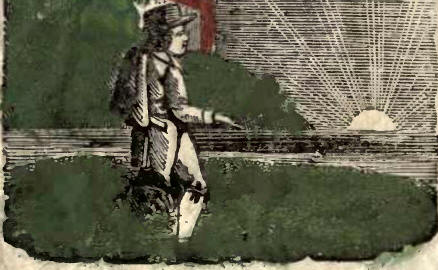
FRONTISPIECE.
Now it chanced that the man had taken his departure
at the rising of the sun.
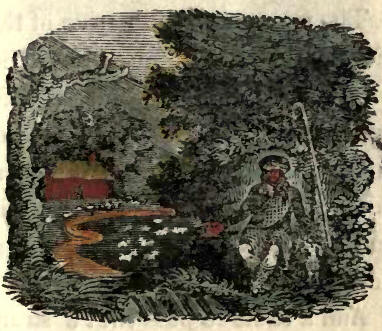
 Now there dwelt in a little valley in the mountains
of the north, a husbandman who was just and upright in his dealings, and
he was a breeder of sheep; and the Lord had blessed him, and his flock-
multiplied exceedingly, and fed upon a thousand hills. Now there dwelt in a little valley in the mountains
of the north, a husbandman who was just and upright in his dealings, and
he was a breeder of sheep; and the Lord had blessed him, and his flock-
multiplied exceedingly, and fed upon a thousand hills.
The man was not a native of the hill country; he came
from the country of the plain; but his wife -was one of the daughters of
the and, even a daughter of the mountains; and her name was Maini: and
they had been married a few years, but had no children. And a came to
pass that a stranger, who was a pilgrim, came down into the valley,
seeking shade and refreshment; and he alighted from his horse, and came
unto their dwelling, which was low and humble, after the rude manner of
building in those parts, and he stooped, and passed the threshold.
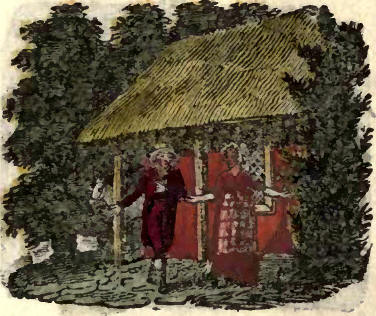
Nov it chanced that the man had taken his departure
at the rising of the sun, and was absent on a journey; but Maini, his
wife, was in the house: and when she saw the stranger she bade him
welcome, and brought him into a little chamber, which was clean though
homely.
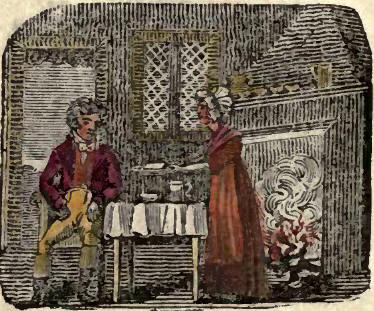
The woman also was also neat in her attire, and fair
spoken; her voice was soft and gentle, and it sounded pleasing in the
ear of the stranger.
Then she brought forth milk and butter, even sweet
butter, in pure vessels; and she hasted to bake a barley calve on the
embers, and set it before him and he did eat.
And she spake cheerfully to him, but with all modesty
and sweetness, and said, "Now, of a surety, this wild country, and the
manners thereof, must seem strange unto thee."
And he said, "The very wildness of the country is
pleasing to me, and for the manners thereof, this kindness to the
traveller must, indeed, seem strange to those who come from afar; for
the people in other parts are not used to be so comfortable to
strangers."
And she said, "Dost thou come from afar? These
mountains, and the rough ways therein, are wearisome to the traveller;
thou needs must want repose."
And the man paused a little, and replied, "I come
from the farthest parts of the south; I am a pilgrim, and the days of my
pilgrimage have been many, and now, indeed, at last, I am weary, and my
beast is weary also: let me, I entreat thee, tarry a few days under the
shadow of thy roof, so shall I have rest, and my beast shall have rest
likewise."
And she seemed to wonder at his request; and she
answered discreetly, and said, "Alas for me! that it is not in my power
to entertain thee; I have heard of the country from which thou comest,
that it is a rich and plentiful country, and the people thereof live in
fair dwellings, and eat of the fat of the land; but this country, as
thou seest, is poor and barren, and the manners thereof are rude and
ignorant; thou canst not, surely, be pleased with such things: my house
also and household stuff are mean and scanty. We intend soon, if the
Lord shall bless us, to make it better: peradventure, if thou shouldst
chance to pass this way hereafter, it will be in my power to receive
thee as I could wish."
But he answered—"Nay, speak not thus to thy servant:
if I shall not straiten thee in thy dwelling, this little chamber will
suffice for my lodging, and the fare which serveth thee will content me
well; but if I should be burdensome to thee, speak the word, and I will
depart."
And she said—"Assuredly thou shalt not depart, if
thou canst be pleased to tarry under this poor roof. Thy stay will not
be long, but I will do what little I can to make it less irksome to
thee,"
And he thanked her for her courtesy, and
said—"Trouble not thyself much to provide for me; a little will suffice.
And he was glad to tarry, for rest was needful to him; and he was
pleased with the understanding and natural courtesy of the woman.
Moreover, he was curious to see the simple manners and household customs
of those parts.
Then they ungirded his beasts, and housed them, and
gave them provender. And Maini carried the
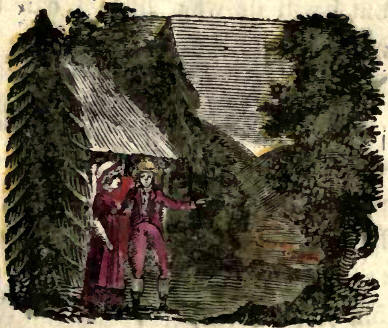
stranger forth into the field beside her dwelling, to
shew him the pleasantness thereof: and lo! it was a little valley of
green pasture, smooth and level, and a swift stream divided it in the
midst; and there were trees for shade; and where the valley opened to
the south it was bounded by a narrow arm of the sea, and on every other
side the mountains stood round it like a mighty wall; aid there was the
sound of many waters, which foamed as they fell from the rocks above,
but where they gathered into a pool beneath were pure and clear as
crystal.
And behold, as they walked in the field, there
chanced to pass that way a shepherd boy, one of those who kept their
flocks on the hills; and she called him unto her, and spake gently to
the lad, and said, "Go fetch a lamb and a kid from the mountain, and see
thou choose
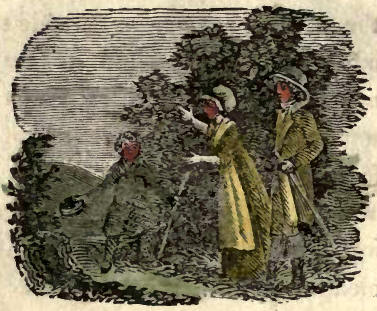
aright, that this stranger may taste of the best of
our flock; and take thy dog with thee, that thou mayest be able to catch
that which thou markest, for thou knowest they are wild on the hills,
and difficult to be taken."
And the stranger said, "Let me now speak a word, I
beseech thee. Send not for both at once; send either for the lamb or for
the kid, as seemeth best unto thee: will not one suffice?"
And she said, "Nay, but the lad shall bring down
both, and we will first eat of the lamb, and I will feed the Kid with
milk from the cow, so shall it be fat, and fit to set before thee when
thou hast eaten of the lamb."
She said, moreover, "I will make for thee whey of the
milk of the goat, if thou wilt drink thereof: it is a pleasant and
wholesome drink."
And he said, "I see thou art kind and careful. Thou
shalt have the blessing of the stranger: do then according to the
kindness of thy word."
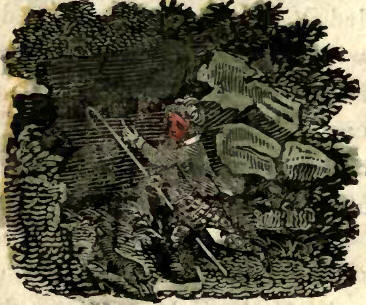
Then she spake again to the lad, and charged him
strictly: so the lad ran, and hasted to the mountain, and his dog went
with him.
But the man stood still in the field, and pondered,
and said within himself, "Surely this is the ancient world, and the
manners of the times of old: did not Sarah or Rebekah do after this this
fashion, Then she received the stranger in the absence of Abraham or
Isaac, her lord"
And as he continued musing, she said, "What musest
thou upon?"
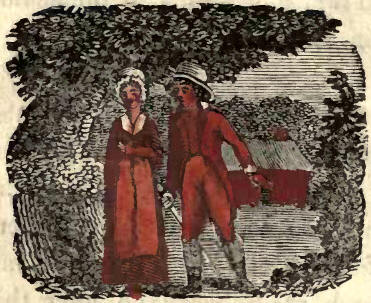
And he turned and looked wistfully on the woman (for
he had not much regarded her countenance before), and he saw that she
was lovely to look upon, and that the favour of her countenance was full
of simplicity and mildness, and loving kindness.
And he cast his eyes around, and the place seemed to
him as a portion of Eden; and the sun was bright in the heavens, and
shone upon benevolence and innocency and he was transported with the
sight, and his heart glowed within him, and he could not refrain from
speaking to her as one surprised; but he spake in a low voice, humbly
and reverently, and said, "Behold I am a stranger in the land, and the
face of the land itself is strange, and what I see around me looks like
enchantment; tell me now, I pray thee, is it usual to meet with angels
among these mountains?"
And she said, "I never heard of any in these parts;
and she blushed lightly, even as the blossom of the wild sweet-briar,
which grew beside her on the bank of that pleasant brook, and smiled,
and held her peace.
And they walked and communed together, and were as
familiar friends; and when he commended the pleasantness of the place,
Maini seemed to mock there at, and said, "To us, indeed, it seemeth a
sweet and pleasant place; but can it be that these wild rocks should
delight the eye of the stranger who cometh from the fruitful country of
the south?"
And he said, "Doth not novelty heighten many
pleasures therefore, perhaps, these wild scenes are more pleasing to me
than to thee who are accustomed to them."
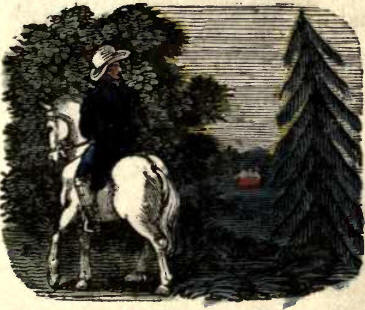
And the man sojourned there more than twenty days:
moreover, when he departed thence, he looked back, and sighed. Then he
took his way through the desart of mountains, and vacancy and silence
were around on every side. And as he journeyed on through the land he
remembered Maini, for hospitality was within her gates, and her little
dwelling was a dwelling of peace.
Benevolence
A Fragment
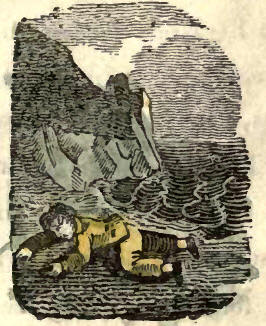
''WHY lay you there—? Have you lost your wav, my
lad?" said I, to a poor sailor boy, as he looked wistfully in my face as
I raised him from the ground. "Have you lost your way, my lad?" said I,
in a still softer tone of expression.
"Yes, your honour," answered he. "But, indeed, (as if
recollecting himself,) "I have no way to chuse; every place is a home to
me, for nobody pities the poor sailor boy. I have sailed two voyages to
Jamaica, your honour, continued he, "and, on my return from the last,
took a long journey - to visit my father: his name is George Trueman;
but he disowned me; said I was no child of his, and turned me adrift. I
returned to the ship, but my place was early supplied; and here I am,
your honour, on my way to London, to seek out a birth for the poor
sailor boy."
As he finished, he was turning away, about to leave
me, when I laid my hand on his arm, to detain him. Whether it was that
he could not read "charity" in my countenance--whether he did not think
himself entitled to my compassion —or from what or other cause it was he
turned away I know not, but of this. I arn certain, if my face did not
wear the kindest look of pity, it belied my heart.
"God help thee!" said I, "thy years," for he had
hardly seen twelve winters, "they are unfit to buffet with the wind of
Fortune, and the tide of Adversity. Fortune is more fickle than all the
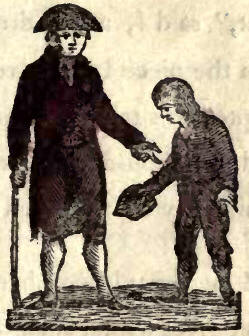
winds, and Adversity more irresistible than all the
waves thou hast ever met with in the Atlantic Ocean!" [I owed Humanity a
debt, and here I paid it.] "And if ever thou seest me in want of
sixpence, thou shalt repay it with interest," said I, as he .dropped a
tear on the piece I had given him. I accepted this tribute of his heart
instead of a thousand thanks, and, buttoning my coat, walked away.
Tell me, ye philosophers, what it is that gives a man
such calrnnes; and tranquillity of mind, that sets him so at peace with
himself, after doing a good action?--For I think ii Doctor Lenitive
himself had Iaid his finger on my pulse at that moment, his stop watch
could not have told him of the least irregularity in the pulsation of
it.
Envy me my feelings, ye who have never felt "the
luxury of doing good;" who have never shed a tear over the miseries of
others; and learn not to suppress the inclinations of doing a good
action; for too true it is that we feel them but seldom.
Finis
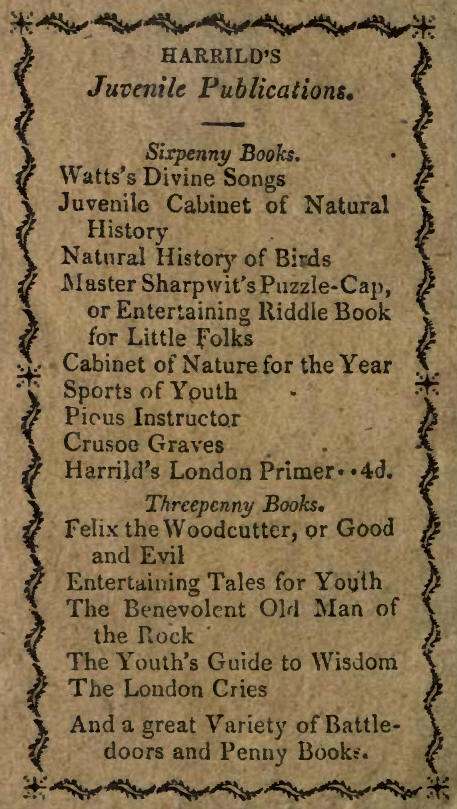
|

